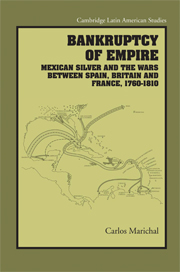Book contents
- Frontmatter
- Contents
- List of Tables and Figures
- Acknowledgements
- Introduction
- 1 Resurgence of the Spanish Empire: Bourbon Mexico as Submetropolis, 1763–1800
- 2 An Imperial Tax State: The Fiscal Rigors of Colonialism
- 3 Imperial Wars and Loans from New Spain, 1780–1800
- 4 The Royal Church and the Finances of the Viceroyalty
- 5 Napoleon and Mexican Silver, 1805–1808
- 6 Between Spain and America: The Royal Treasury and the Gordon & Murphy Consortium, 1806–1808
- 7 Mexican Silver for the Cortes of Cádiz and the War against Napoleon, 1808–1811
- 8 The Rebellion of 1810, Colonial Debts, and Bankruptcy of New Spain
- Conclusions: The Financial Collapse of Viceroyalty and Monarchy
- Appendixes
- Bibliography
- Index
- CAMBRIDGE LATIN AMERICAN STUDIES
Introduction
Published online by Cambridge University Press: 14 July 2009
- Frontmatter
- Contents
- List of Tables and Figures
- Acknowledgements
- Introduction
- 1 Resurgence of the Spanish Empire: Bourbon Mexico as Submetropolis, 1763–1800
- 2 An Imperial Tax State: The Fiscal Rigors of Colonialism
- 3 Imperial Wars and Loans from New Spain, 1780–1800
- 4 The Royal Church and the Finances of the Viceroyalty
- 5 Napoleon and Mexican Silver, 1805–1808
- 6 Between Spain and America: The Royal Treasury and the Gordon & Murphy Consortium, 1806–1808
- 7 Mexican Silver for the Cortes of Cádiz and the War against Napoleon, 1808–1811
- 8 The Rebellion of 1810, Colonial Debts, and Bankruptcy of New Spain
- Conclusions: The Financial Collapse of Viceroyalty and Monarchy
- Appendixes
- Bibliography
- Index
- CAMBRIDGE LATIN AMERICAN STUDIES
Summary
From before the time of Gibbon, historians with a global perspective have been discussing the rise and fall of empires. Today political scientists frequently speak of hegemonic states. If we review some of the best-known studies conducted over the last forty-odd years, it is possible to identify a variety of theoretical approaches adopted by those working on the history of imperial or hegemonic states. The literature is vast and includes traditional geopolitical studies with a focus on the roots of military superiority, the sweeping propositions of the world-system school, as well as the interpretations of historical sociologists who offer explanations based on the changing capacities of states to exercise power through manipulation of capital and coercion. While all raise important questions, these quite general approaches do not necessarily provide convincing answers to the issue of explaining the specific reasons for the rise and/or decline of a given state or empire.
Fortunately, in recent years, numerous historians have adopted a more focused approach, analyzing specific features of the historical evolution of states that can be studied in considerable depth, both empirically and theoretically. One of the most fruitful of these is the analysis of the fiscal and financial structures of ancien regime monarchies and/or empires as well as modern states. The advantage of such an approach is that it allows for major insights into the specific links between economy and polity.
- Type
- Chapter
- Information
- Bankruptcy of EmpireMexican Silver and the Wars Between Spain, Britain and France, 1760–1810, pp. 1 - 15Publisher: Cambridge University PressPrint publication year: 2007

